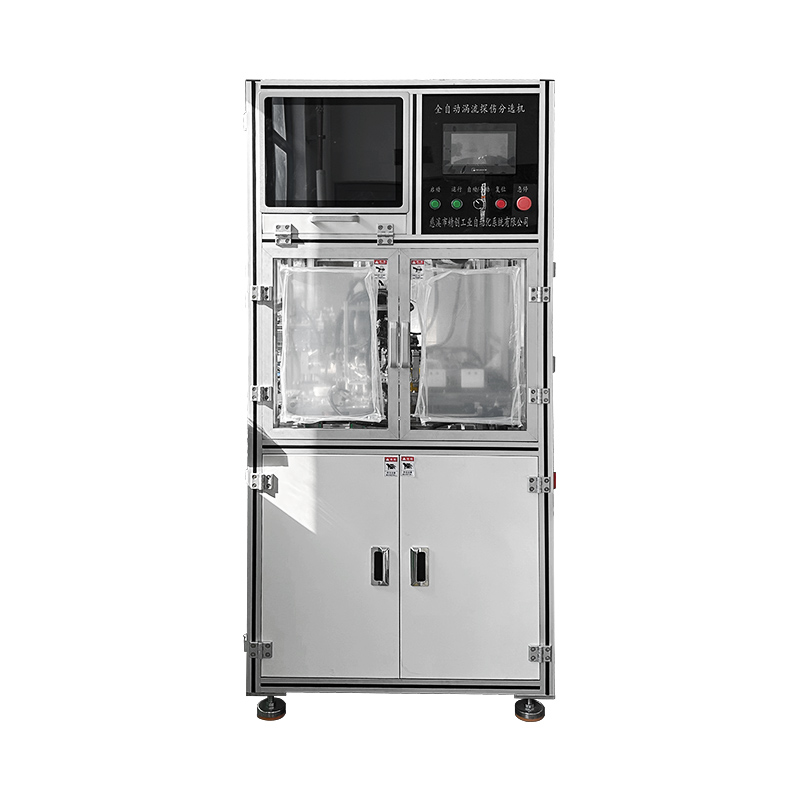设备主要技术性能
1. Sensitivity of flaw detection: Cracks and defects with a depth of ≥ 0.06mm and a length of ≥ 2mm extending from the surface of the workpiece into the metal; For cracks inside the metal that have not yet extended to the surface of the workpiece, cracks with a depth of ≥ 0.2mm and a length of ≥ 2mm can be detected when the metal thickness between the upper edge of the crack and the surface of the workpiece is ≤ 0.2mm
2. Misjudgment rate: 0%, which means 99.99% of non-conforming products are removed; Misjudgment rate ≤ 2%. All rejected products can be retested once to reduce misjudgment.
3. Detection frequency range: 100Hz~1MHz, adjustable.
4. Band pass filtering, center frequency 250-1000KHz, 8 levels
5. Gain: Each channel has a gain of 0-60dB, with an adjustment of 1dB per level
6. Phase: 0 °~360 °, with a step distance of 1
Principle of eddy current testing:
Eddy current detection is the application of electromagnetic induction principle, which excites the probe coil with a sine wave current. When the probe approaches the metal surface, the alternating magnetic field around the coil generates induced current on the metal surface. For flat metal, the direction of induced current is a concentric circular coil, resembling a vortex, called an eddy current. At the same time, eddy currents also generate a magnetic field of the same frequency, which is opposite to the direction of the coil magnetic field. The loss resistance of the eddy current channel, as well as the anti magnetic flux generated by the eddy current, are reflected back to the probe coil, changing the current magnitude and phase of the coil, that is, changing the impedance of the coil. Therefore, when the probe moves on the metal surface and encounters defects or changes in material, size, etc., the reaction of the eddy current magnetic field on the coil is different, causing changes in the coil impedance. By measuring this change with an eddy current detection instrument, the presence of defects or other physical and material changes on the metal surface can be identified. There are many factors that affect the eddy current field, such as the degree of coupling between the probe coil and the tested material, the shape and size of the material, conductivity, permeability, and defects. Therefore, the principle of eddy current can be used to solve problems such as metal material inspection, thickness measurement, and sorting
Technical parameters:
Sensitivity of flaw detection: cracks and defects that extend from the surface of the workpiece to the inside of the metal with a depth of ≥ 0.05 mm and a length of ≥ 2 mm; For cracks inside the metal that have not yet extended to the surface of the workpiece, cracks with a depth of ≥ 0.20mm and a length of ≥ 1mm can be detected when the metal thickness between the upper edge of the crack and the surface of the workpiece is ≤ 0.2 mm.
The distinctive feature of eddy current flaw detectors is that they can work on conductive raw materials, not necessarily ferromagnetic raw materials, but their actual effect on ferromagnetic raw materials is relatively weak. Secondly, the smoothness, flatness, and edge spacing of the workpiece surface of the product to be tested pose great risks to eddy current testing. Therefore, high-speed eddy current testing instruments are often used for testing non ferromagnetic product workpieces such as air conditioning copper pipes with relatively standard appearance and smooth surface. Eddy current flaw detector is an instrument and equipment that uses the principle of eddy current to detect defects on metal surfaces. Eddy current flaw detection is a non-destructive testing technique that communicates the magnetic induction of AC magnetic coils on the surface of metal components, causing vortices. It is suitable for ultrasonic testing of conductive raw materials, including ferromagnetic and non-ferromagnetic metal composite components. Due to eddy current testing, it is not specified that the electromagnetic coil and the component are inseparable during inspection, nor is it necessary to fill the coupling agent between the electromagnetic coil and the component, making it very easy to achieve automated testing technology. Aluminum tube eddy current flaw detector is widely used in the bar and pipe industry due to its extraordinary characteristics.
|

